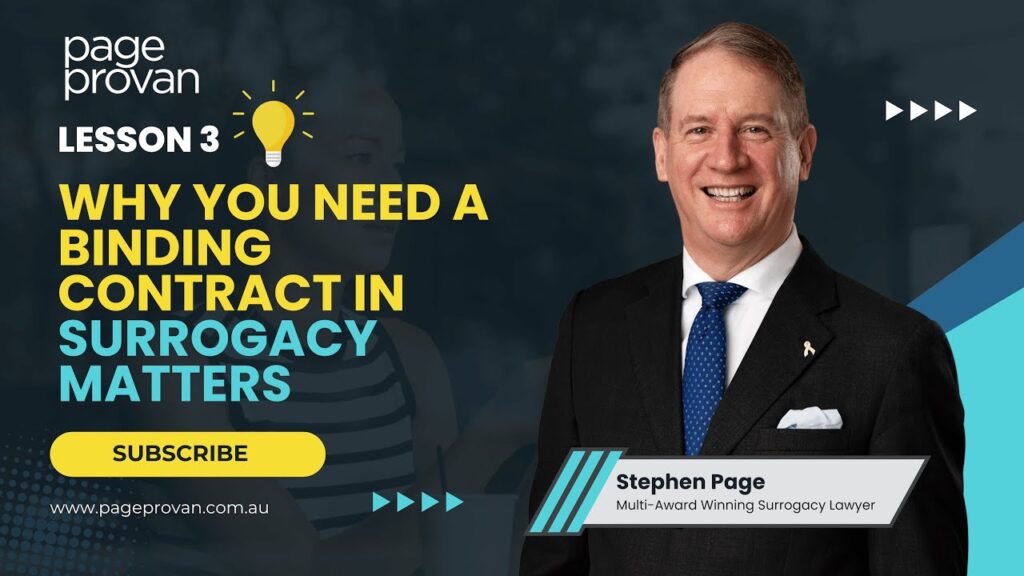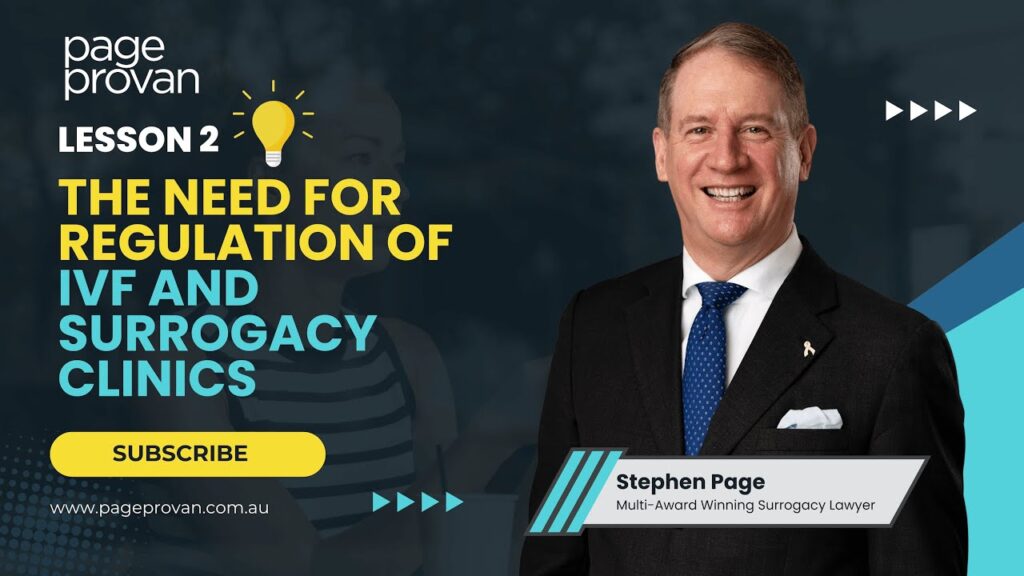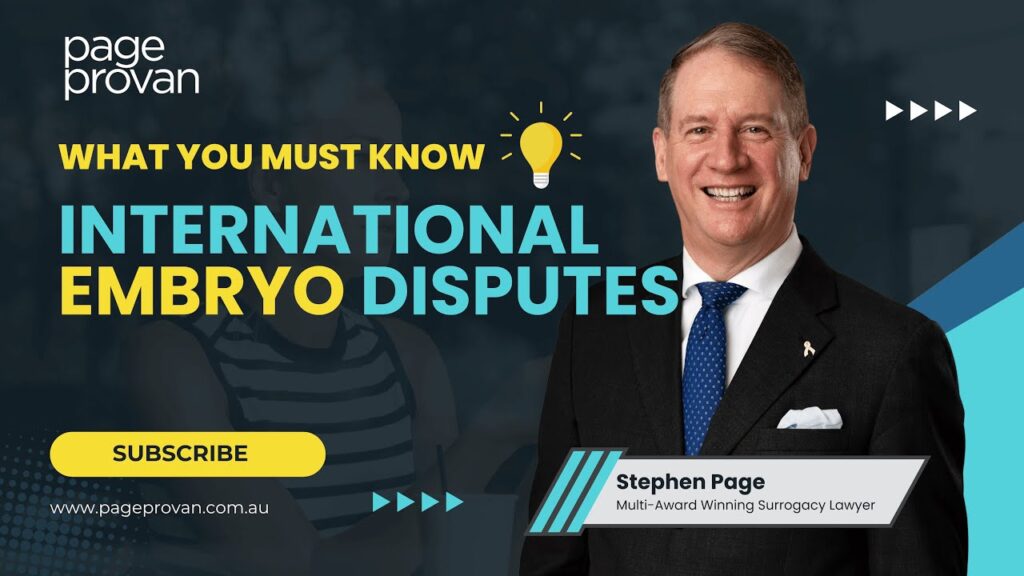Commercial surrogacy: updated State by State guide
This guide is accurate as of 28 November, 2010.
If you are contemplating entering into, or have entered into a commercial surrogacy arrangement or agreement, get good legal advice- NOW. You may be or have committed a criminal offence.
I have provided advice to clients in several states and overseas about commercial surrogacy.
Commercial surrogacy is illegal in Australia, except for the Northern Territory. In the NT, commercial surrogacy is in effect banned because the doctors providing IVF treatment are from Adelaide, and subject to South Australian licensing and laws.
MP’s have generally taken the view that commercial surrogacy involves the exploitation of women, especially those from the third world, and also involves the treatment of children as commodities.
The reality however is that Australians have used and will continue to use overseas commercial surrogacy clinics. For example, as seen in two Family Court cases, Victorian gay couples in Re Mark and Cadet and Scribe, went to the US, undertook commercial surrogacy and ended up with orders for the parenting of the children from the Family Court. In both cases when the men undertook the arrangements, it was an offence for them to undertake commercial surrogacy both in Victoria and overseas.
Each of the States and Territories have different rules about their residents having children through overseas commercial clinics.
Queensland
Law: Surrogacy Act 2010
Status: Commercial surrogacy banned anywhere in the world.
It is a criminal offence for any commercial surrogacy arrangement to be entered into in Queensland. It is also a criminal offence for a person ordinarily resident in Queensland to enter into a commercial surrogacy arrangement anywhere in the world. This Act in effect repeats the repealed Surrogate Parenthood Act 1988[PDF]. It has been an offence since 1988 to engage in commercial surrogacy in Queensland or for someone ordinarily resident in Queensland to engage in surrogacy somewhere else, including through overseas clinics.
The Surrogacy Act 2010 bans commercial surrogacy both in Queensland and by those ordinarily resident in Queensland anywhere in the world. It does this by:
-banning advertisements
-banning commercial surrogacy
-payment (other than for the surrogate’s reasonable surrogacy costs)
-providing technical and medical assistance if the person knows the other person is, or intends to be, a party to a commercial surrogacy arrangement; and the person provides the service with the intention of assisting the other person to become pregnant for the purpose of the arrangement. (It doesn’t apply if the surrogate is already pregnant).
New South Wales
Legislation: Assisted Reproductive Technology Act 2007
Status: Commercial surrogacy banned only in NSW. Soon: banned anywhere in the world.
Commercial surrogacy is banned in NSW. NSW residents are currently not banned from going to overseas commercial surrogacy clinics and entering into contracts or arrangements there.
The Act makes it an offence to:
-enter into a commercial surrogacy agreement
-arrange a commercial surrogacy agreement
-accept any benefit under a commercial surrogacy agreement
-advertise for commercial surrogacy
Commercial surrogacy agreements are void.
Going, going, gone…
NSW has now passed the Surrogacy Act 2010. This Act is due to be proclaimed on a date to be fixed, but in all likelihood before Christmas. Any day now. When this Act comes into effect, it will be an offence for those who reside in or are domiciled in NSW from engaging in acts of commercial surrogacy, wherever that might be, whether in Australia or overseas.
The passage of the bill has created a firestorm of protest, but protests are unlikely to make any difference, at least in the short term.
“Residence” and “domicile” are different legal concepts. Residence is pretty clear- that you live in the location. Domicile is a wider concept. In law there are essentially two types of domicile. One is a domicile of choice: a person has chosen to be a permanent resident somewhere, for example in NSW. The other is domicile of origin: a person was born in NSW, and has not adopted a domicile of choice, because for example they travel around the world, or they have abandoned their domicile of choice, and keep their domicile of origin. Such a person, who does not live in NSW, will be caught up in this legislation. The Wikipedia article on domicile is a useful starting point.
If in doubt, get advice. I am happy to provide advice to those in NSW about the effect of the changes.
Australian Capital Territory
Legislation: Parentage Act 2004
Status: Commercial surrogacy banned anywhere in the world.
Commercial surrogacy is banned in the ACT. The law does this by:
-banning commercial substitute parentage agreements
-banning the advertising for surrogacy
-banning the procuring of commercial substitute parentage agreements
-banning the facilitation of pregnancy
It is an offence for ACT residents to engage in any of these anywhere in the world “if, when the offence is committed, the person who commits the offence is ordinarily resident in the ACT”.
Victoria
Legislation: Assisted Reproductive Treatment Act 2008
Status: Commercial surrogacy banned only in Victoria.
Commercial surrogacy including overseas commercial surrogacy was banned under the Infertility Treatment Act 1995 [PDF]. That Act was repealed on 1 January 2010, with the coming into force of the Assisted Reproductive Treatment Act 2008.
The 2008 Act bans commercial surrogacy in Victoria, but does not ban Victorians from accessing overseas commercial surrogacy clinics.
Tasmania
Law: Surrogacy Contract Acts 1993
Status: Commercial surrogacy banned only in Tasmania.
Commercial surrogacy is banned. The Act does not ban Tasmanians from accessing overseas commercial surrogacy clinics.
South Australia
Legislation: Family Relationships Act 1975
Status: Commercial surrogacy banned only in South Australia.
Commercial surrogacy is banned, including payment and advertising for surrogacy. There is no restriction on South Australians attending overseas commercial surrogacy clinics.
The Statutes Amendment (Surrogacy) Act 2009 (which in turn has been amended) is still waiting to commence. It amends the 1975 Act. Commercial surrogacy remains banned. There is no restriction on South Australians attending overseas commercial surrogacy clinics.
Western Australia 2008
Legislation: Surrogacy Act 2008
Status: Commercial surrogacy banned only in WA. However, WA regulator threatened with prosecution those mentioning overseas commercial surrogacy clinics.
Commercial surrogacy is banned, including advertising or making the arrangement.
It is an offence to facilitate a commercial surrogacy arrangement:
“(1)A person who provides a service knowing that the service is to facilitate a surrogacy arrangement that is for reward commits a crime except in the circumstances described in subsection (2).
(2) It is not an offence against subsection (1) if the service is a health service provided to the birth mother after she has become pregnant. “
The nature of this offence extends beyond health professionals, and might include, for example, brokers for overseas commercial surrogacy clinics.
The ban on accessing commercial surrogacy does not extend to attending overseas commercial surrogacy clinics.
Northern Territory
Status: Commercial surrogacy legal (but non-existent). Legal for Territorians to access overseas commercial surrogacy clinics.
There is no legislation covering NT citizens. It is therefore not an offence for a Territorian to go to commercial surrogacy clinics.There are no such clinics in the NT. It is not an offence for a Territorian to go to an overseas commercial surrogacy clinic.












